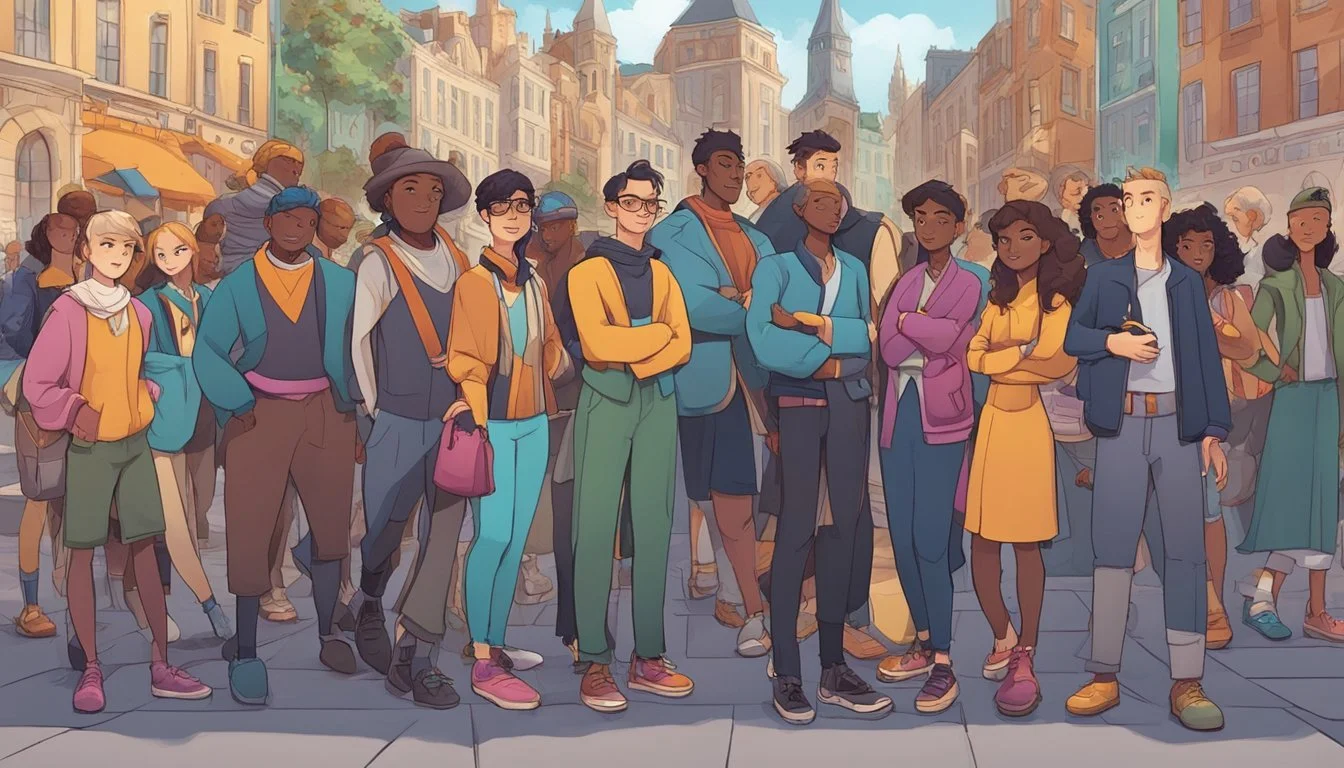Unlock the Hidden Truths of Bleach Personality Types: Who Are You Really Like?
Bleach captivates fans with its diverse cast of characters, each possessing unique traits and motivations. The popular anime and manga series features Soul Reapers, humans, and otherworldly beings with distinct personalities that shape their actions and relationships. By examining Bleach characters through the lens of personality types, fans can gain deeper insights into their favorite heroes and villains.
Personality typing systems like MBTI provide a framework for understanding character behaviors and decision-making processes. From the determined ISFP Ichigo Kurosaki to the calculating INTJ Sosuke Aizen, Bleach's expansive roster covers a wide range of personality types. This variety adds depth to the story's conflicts and alliances, making the series more engaging for viewers and readers.
Analyzing personality types in Bleach can enhance appreciation for the intricate character development and storytelling. It allows fans to predict how characters might react in different situations and understand the reasons behind their choices. Whether examining the sociable nature of Rukia Kuchiki or the commanding presence of Byakuya Kuchiki, personality typing offers a fresh perspective on the beloved action series.
Overview of Bleach
Bleach is a popular Japanese manga and anime series created by Tite Kubo. The story revolves around Ichigo Kurosaki, a teenager who gains the powers of a Shinigami (Soul Reaper) after a chance encounter with Rukia Kuchiki.
Shinigami are spiritual beings tasked with guiding souls to the afterlife and protecting the living world from evil spirits called Hollows. The series primarily takes place in Karakura Town and the spiritual realm known as Soul Society.
As the narrative unfolds, Ichigo and his friends face increasingly powerful foes. They encounter various factions, including the Arrancar, Visored, and Quincy.
The Sternritter, an elite group of Quincy warriors, play a significant role in the final arc of the series. Led by the enigmatic Yhwach, they pose a major threat to Soul Society and the balance of the spiritual world.
Bleach explores themes of friendship, duty, and personal growth. Characters often grapple with their identities and motivations as they navigate complex conflicts.
The series is known for its diverse cast of characters, each with unique abilities and personalities. This rich character development contributes to the story's depth and appeal.
Understanding Personality Typologies
The Myers-Briggs Type Indicator (MBTI) is a widely used framework for categorizing personality types. It classifies individuals into 16 distinct types based on four key dimensions:
Extraversion (E) vs. Introversion (I)
Sensing (S) vs. Intuition (N)
Thinking (T) vs. Feeling (F)
Judging (J) vs. Perceiving (P)
These combinations yield personality types like INTJ, ESFP, and so on. Each type exhibits unique traits, strengths, and potential areas for growth.
Personality typologies can offer insights into an individual's natural tendencies and preferences. They may influence how someone approaches leadership, handles responsibility, or expresses compassion.
For example, a person with a "Feeling" preference might lead with empathy and focus on team harmony. Someone with a "Thinking" preference may prioritize logic and efficiency in decision-making.
It's important to note that personality types are not fixed or deterministic. People can develop skills and behaviors outside their typical preferences through discipline and practice.
Understanding one's personality type can be a valuable tool for self-awareness and personal development. It may help individuals recognize their strengths and identify areas where they can grow or complement their natural inclinations.
Main Characters and Their Personalities
Bleach features a diverse cast of characters with distinct personalities that shape their actions and motivations. The main protagonists and antagonists exhibit unique traits that align with different MBTI types.
Ichigo Kurosaki
Ichigo, the series protagonist, displays traits consistent with an ENTP personality. He's quick-witted, adaptable, and thrives on challenges. His strong sense of responsibility drives him to protect others, often at great personal risk.
Ichigo's rebellious nature and tendency to question authority reflect his innovative thinking. He excels at improvising in battle, showcasing the ENTP's problem-solving skills.
His journey from substitute Soul Reaper to powerful warrior highlights his growth. Ichigo's loyalty to friends and family remains a core aspect of his character throughout the series.
Rukia Kuchiki
Rukia embodies many characteristics of an ISFP personality. She's dutiful and loyal, with a strong moral compass guiding her actions. Her artistic side emerges in her fondness for drawing, albeit with questionable skill.
As a Soul Reaper, Rukia takes her responsibilities seriously. She struggles with self-doubt at times but shows great courage when protecting others.
Rukia's interactions with Ichigo reveal her adaptability and growing self-confidence. Her journey from a by-the-book Soul Reaper to a more nuanced individual demonstrates significant personal growth.
Orihime Inoue
Orihime aligns closely with the INFP personality type. She's compassionate, idealistic, and deeply attuned to others' emotional needs. Her healing abilities reflect her desire to help and support those around her.
Despite facing tragedy, Orihime maintains an optimistic outlook. Her vivid imagination and sometimes quirky behavior endear her to friends and allies.
Orihime's character development involves overcoming self-doubt and recognizing her own strength. Her unwavering loyalty to Ichigo and her friends drives many of her actions throughout the series.
Uryu Ishida
Uryu displays traits typical of an ISTP personality. He relies heavily on logic and instinct, especially in combat situations. His disciplined approach to training and fighting showcases his analytical mindset.
As a Quincy, Uryu takes pride in his heritage and abilities. He initially clashes with Ichigo but develops a grudging respect for him over time.
Uryu's reserved nature masks a fierce loyalty to his principles and allies. His strategic thinking and adaptability make him a valuable asset in battles against powerful foes.
Sosuke Aizen
Aizen exhibits many traits associated with the INTJ personality type. He's highly intelligent, strategic, and confident in his abilities. His long-term planning and manipulation of others showcase his leadership skills.
As the series' primary antagonist, Aizen's actions have far-reaching consequences. He's driven by a desire for power and a belief in his own superiority.
Aizen's charisma and ability to present a false persona highlight his complex nature. His ultimate defeat serves as a cautionary tale about the dangers of unchecked ambition and arrogance.
Yasutora Sado (Chad)
Chad embodies the ISFJ personality type, often referred to as the "Defender." His quiet strength and unwavering loyalty make him a dependable ally to Ichigo and others.
Despite his imposing physical presence, Chad is gentle and kind-hearted. He values harmony and prefers to avoid conflict when possible.
Chad's character growth involves learning to embrace his unique abilities. His determination to protect others drives him to become stronger, both physically and emotionally.
Secondary Characters and Their Roles
Bleach's secondary characters play vital roles in shaping the series' narrative and supporting the main protagonists. These individuals bring unique personalities and abilities that enrich the Soul Society and broader Bleach universe.
Renji Abarai
Renji Abarai, a powerful Soul Reaper, embodies the ESTP personality type. His impulsive nature and adaptability shine through in combat situations. As Byakuya Kuchiki's lieutenant, Renji's loyalty and determination drive his actions.
Renji's journey from Rukongai orphan to respected Shinigami showcases his growth. His rivalry with Ichigo Kurosaki pushes both characters to new heights. Renji's Bankai, Hihio Zabimaru, reflects his fierce spirit and raw power.
In battles, Renji relies on instinct and quick thinking. His brash attitude often leads to confrontations, but his unwavering loyalty to friends and comrades defines his character.
Yoruichi Shihoin
Yoruichi Shihoin, the "Flash Goddess," exemplifies the ENTJ personality type. Her strategic mind and natural leadership abilities make her a formidable ally and mentor.
As former captain of the 2nd Division, Yoruichi's combat prowess and stealth skills are unparalleled. Her unique ability to transform into a cat adds an element of mystery to her character.
Yoruichi's mentorship of Ichigo and Orihime proves crucial in their development. Her confident and playful demeanor masks a sharp intellect and centuries of experience in Soul Society politics.
Soul Reapers
Soul Reapers, or Shinigami, form the backbone of Soul Society. These spiritual beings maintain balance between the living world and the afterlife. Their duties include guiding souls and purifying Hollows.
Soul Reapers possess unique Zanpakuto, spiritual swords that reflect their personalities and powers. The hierarchy within the Gotei 13, Soul Society's military force, shapes their interactions and responsibilities.
Notable Soul Reapers include:
Toshiro Hitsugaya: Child prodigy captain
Kenpachi Zaraki: Battle-loving 11th Division leader
Shunsui Kyoraku: Laid-back strategist
Each Soul Reaper brings distinct abilities and personality traits to their roles, enriching the complex world of Bleach.
Personality Types and Battle Styles
Bleach characters exhibit distinct personality types that strongly influence their combat approaches. These traits shape their strategies, fighting styles, and roles on the battlefield.
Strategists and Tacticians
INTJ and INTP types often excel as strategists in Bleach. Characters like Kisuke Urahara and Sosuke Aizen embody this archetype. They analyze situations meticulously, formulating complex plans to outmaneuver opponents.
These personalities prefer to fight from a distance, using their intellect as their primary weapon. They may employ Kido or unique Zanpakuto abilities to control the flow of battle.
INTJs like Byakuya Kuchiki demonstrate exceptional leadership skills. They make decisive choices based on logic and long-term consequences. Their calm demeanor under pressure proves invaluable in critical moments.
Frontline Warriors
ESTJ and ESFP types thrive as frontline fighters. Characters such as Kenpachi Zaraki and Ichigo Kurosaki exemplify this category. They rely on raw power, instinct, and adaptability in combat.
These personalities prefer direct confrontations, often charging headfirst into battle. They excel in close-quarters combat, utilizing their Zanpakuto and physical abilities to overwhelm opponents.
ESTJs like Toshiro Hitsugaya display natural leadership on the battlefield. They make quick, practical decisions and inspire allies with their unwavering resolve. Their Bankai releases often reflect their decisive nature.
Supportive Allies
ISFJ and ESFJ types often serve as supportive allies in Bleach. Characters like Orihime Inoue and Retsu Unohana fall into this category. They prioritize the well-being of their comrades and provide crucial assistance during battles.
These personalities excel in healing, defense, and tactical support roles. They may use their abilities to shield allies, restore injuries, or create advantageous battlefield conditions.
ISFJs like Rukia Kuchiki demonstrate unwavering loyalty and dedication to their comrades. They offer emotional support and practical aid, often putting themselves at risk to protect others. Their combat styles typically focus on utility and teamwork.
Themes of Bleach and Psychological Underpinnings
Bleach explores profound psychological themes through its characters and storylines. The series delves into the complexities of human nature, examining how individuals navigate their emotions, responsibilities, and inner conflicts.
Action in Bleach often serves as a catalyst for character growth. Through intense battles, characters confront their fears, limitations, and true motivations. This process mirrors real-world psychological development.
Compassion emerges as a central theme, particularly in Ichigo's character arc. His drive to protect others stems from a deep-seated empathy, reflecting the human need for connection and altruism.
Instincts play a crucial role in character decisions. Many characters grapple with their primal urges, balancing them against societal expectations and personal values. This struggle highlights the ongoing tension between conscious thought and subconscious drives.
Emotional needs drive character motivations throughout the series. Characters seek acceptance, validation, and purpose, mirroring basic human psychological desires. These needs often shape their actions and relationships.
Responsibility weighs heavily on many characters in Bleach. The burden of power and duty creates internal conflicts, forcing characters to confront their own limitations and make difficult choices. This theme resonates with real-world psychological concepts of self-efficacy and moral decision-making.
Cultural Impact and Reception
Bleach's diverse cast of characters with distinct personality types has left a significant mark on popular culture. The series' exploration of leadership styles and compassion through its characters resonated strongly with fans worldwide.
Characters like Ichigo Kurosaki and Rukia Kuchiki became iconic figures, inspiring cosplay and fan art. Their contrasting personalities and growth throughout the series sparked discussions about personal development and overcoming adversity.
The show's portrayal of various leadership approaches, from Captain Yamamoto's strict authority to Urahara's laid-back guidance, provided viewers with different models of influence and power dynamics.
Bleach's representation of compassion, particularly through characters like Orihime Inoue, added depth to the action-packed storyline. This balance of emotional complexity and intense battles contributed to the series' broad appeal.
The personality types depicted in Bleach have been subjects of fan analysis and debate. Many viewers found themselves relating to specific characters based on shared traits or aspirations.
Bleach's cultural impact extended beyond entertainment, inspiring academic discussions on character psychology and narrative structure in manga and anime. Its unique blend of supernatural elements and personal growth stories continue to influence contemporary works in the genre.






